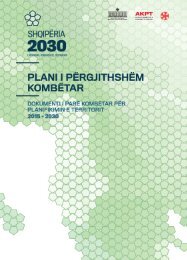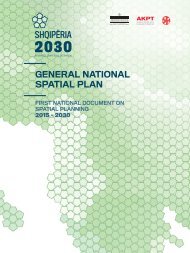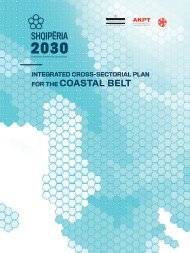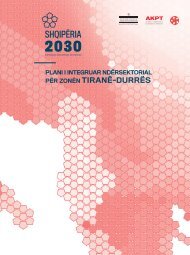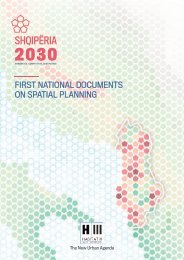Integrated Cross-Sectorial Plan of Tirana-Durres Area
The Albanian Government and the National Spatial Plan have identified the Tiranë-Durrës area, as one of the most important economic areas of the country, and of the Balkan region. To ensure a sustainable territorial and urban development of this area, the Ministry of Urban Development in cooperation with the National Territorial Planning Agency has taken the initiative to draft a Cross-sectoral Integrated Plan for the economic area Tiranë – Durrës. The metropolitan region under study includes territories administered by 5 municipalities: Tiranë, Durrës, Vorë, Shijak, Kamëz.
The Albanian Government and the National Spatial Plan have identified the Tiranë-Durrës area, as one of the most important economic areas of the country, and of the Balkan region. To ensure a sustainable territorial and urban development of this area, the Ministry of Urban Development in cooperation with the National Territorial Planning Agency has taken the initiative to draft a Cross-sectoral Integrated Plan for the economic area Tiranë – Durrës. The metropolitan region under study includes territories administered by 5 municipalities: Tiranë, Durrës, Vorë, Shijak, Kamëz.
You also want an ePaper? Increase the reach of your titles
YUMPU automatically turns print PDFs into web optimized ePapers that Google loves.
Role 15: Promoting funding programs that<br />
increase competitiveness<br />
One <strong>of</strong> the easiest ways to foster cooperation<br />
between firms and achieve economies <strong>of</strong><br />
scale is by considering only proposals from<br />
joint venture groups, even if they are in the<br />
initial stages <strong>of</strong> cooperation.<br />
Objectives for such funding may include:<br />
• support towards business concentrations or<br />
associations with complementary features <strong>of</strong><br />
each other;<br />
• company consortia for the technical and<br />
managerial services needed to train network<br />
companies;<br />
• consortia <strong>of</strong> small companies that serve to<br />
develop or improve job vacancies.<br />
Role 16: Investing in R & D clusters<br />
Much <strong>of</strong> the advanced scientific research is<br />
conducted in public / private universities.<br />
Historically, they have been funded<br />
through the curricula, but not necessarily<br />
related to regional economies. Funds<br />
are usually focused on publications, not<br />
commercialization. Research in these<br />
institutions should be promoted, driven by<br />
the needs <strong>of</strong> the local economy and not by<br />
the global trend in faculty development. In<br />
such way, investments can have immediate<br />
benefits.<br />
Clusters can be supported by:<br />
a. adding to the funding criteria<br />
the importance and potential <strong>of</strong><br />
commercialization that scientific research<br />
can have on the regional and local economy,<br />
based on measurable and monitorable<br />
results;<br />
b. allocating more research funds in less<br />
favoured parallel institutions.<br />
Role 17: Encouraging the use <strong>of</strong> incubators<br />
Incubators are already widely used<br />
instruments for supporting new and small<br />
business ventures, providing space and lowcost<br />
technical and consulting services that<br />
promote the dissemination <strong>of</strong> knowledge and<br />
technology within clusters.<br />
It is suggested to build them with<br />
partnerships between the private business<br />
and academia, where central and local<br />
government can be coordinators and<br />
facilitators <strong>of</strong> decision-making processes.<br />
Role 18: Establishing technological centres<br />
Many developed economies have invested in<br />
technology centres as part <strong>of</strong> the regional<br />
economic development policies. These<br />
centres are <strong>of</strong>ten linked with educational<br />
institutions and incubation centres, but there<br />
are times when they are independent.<br />
Focusing on local technology clusters can<br />
stimulate innovation and simplify technology<br />
transfer.<br />
Role 19: Using clusters as a promotional<br />
mechanism<br />
Different states have used clusters to selfpropagate<br />
as suitable places to do business<br />
and to visit. Scotland, New Zealand, Canada,<br />
Spain, Ireland and Italy are some <strong>of</strong> the<br />
countries that have used clusters effectively<br />
to promote regions with a focus on investors<br />
and potential new clients.<br />
The creation <strong>of</strong> these opportunities will have<br />
to be integrated with regional development<br />
and branding strategies, as well as national<br />
regional policies.<br />
Role 20: Supporting the development <strong>of</strong><br />
export networks<br />
Small and medium-sized companies suffer<br />
from lack <strong>of</strong> resources and skills / knowledge<br />
on interaction opportunities with potential<br />
partners and buyers in other countries to<br />
maximize the potentials <strong>of</strong> the global market.<br />
Governance can foster the creation <strong>of</strong> workbased<br />
export companies in the clustered<br />
network, with the aim <strong>of</strong> attracting skills /<br />
knowledge from enterprises for the creation<br />
<strong>of</strong> a regional information base that can<br />
create a critical mass to exploit global export<br />
opportunities. Usually the result is a forum<br />
for collaboration / cooperation with a wider<br />
scope than just exporting products.<br />
89










